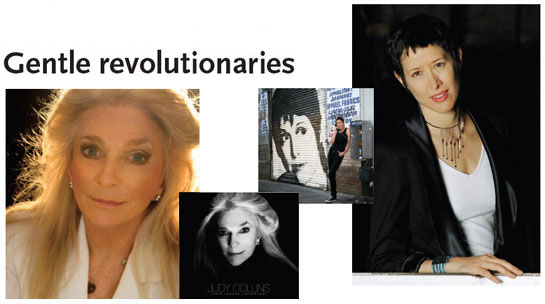
JUDY COLLINS
Singer/songwriter, discoverer of new talent, author, muse, activist and humanist, Judy Collins is best known as a vocalist. A child prodigy, Judy Collins played classical piano first, but turned to folk music at 15. Moved by the music of Woody Guthrie, Pete Seeger and the folk revival of the early ’60s, she developed a love for lyrics and for the guitar, releasing her first album in 1961, at 22.
1966’s In My Life started showcasing her broad repertoire. The album included songs by Bob Dylan, Donovan, Richard Farina, Leonard Cohen, Randy Newman, Lennon/McCartney, Jacques Brel and Kurt Weill—an unheard-of assembly at the time. It introduced her audience to Leonard Cohen, and 1967’s Wildflowers featured the writing of then-little-known songwriter Joni Mitchell. Wildflowers included “Both Sides Now,” which has since been entered into the Grammy’s Hall of Fame; Collins’ version of “Send in the Clowns,” a Broadway musical ballad by Stephen Sondheim, garnered Song of the Year in 1975.
In 1992, Collins’ only son committed suicide at 33. Characteristically, Collins turned her personal tragedy into help for others, and works of art. Tirelessly campaigning on behalf of suicide prevention, she also penned her memoir Sanity and Grace: A Journey of Suicide, Survival and Strength, which has provided comfort to those with similar losses. Her song “Wings of Angels,” also about her son, is on her Wildflower Festival CD and DVD, and features guests Arlo Guthrie, Eric Anderson and Tom Rush.
Touring this summer with Nanci Griffith and Dar Williams (among others), Judy Collins Sings Lennon & McCartney is out this July on her own Wildflower label. Without a doubt, the gem we know as Judy Collins will add even more luster to Beatles’ songs.
MICHELLE SHOCKED
Michelle Johnston was born near Dallas, Texas to a strict Mormon mother and a country music-loving father who separated when she was young. Michelle ran away from home and moved in with her father in Austin. Michelle’s father introduced his 15-year-old to the music of Randy Newman and Guy Clark, who influenced Michelle’s style.
A jump to San Francisco got her involved in the punk rock scene. Protesting at the Democratic National Convention, she was arrested and gave authorities a false name, “Michelle Shocked,” a play on “shell-shocked.” She returned to her mother’s home only to find herself placed in a psychiatric hospital. Released in 1983, “Shocked” made her way to New York City, then to Amsterdam.
In ’86, back in the US and while volunteering at the Kerrville Folk Festival, English record producer Pete Lawrence recorded—on a Sony Walkman— a few tracks of Shocked playing guitar around a campfire. Unbeknownst to Shocked, he named them The Texas Campfire Tapes and released it in England, where it soon topped the British Independent charts.
Shocked signed with Mercury Records and recorded her official debut album, Short Sharp Shocked, combining blues and folk influences with feminist, counter-culture ideals. Shocked proposed a gospel album which Mercury refused, beginning a three-year contract battle. Finally Mercury issued a compilation album and released Shocked from her contract. Reappearing in 2002, she released her gospel album, Deep Natural, on her own label, Mighty Sound.
The activist Shocked continues to promote her convictions. “Whatever disadvantages you experience should help you understand that there are all manner of points of view that are disadvantaged. I hope to be a gentle reminder to people that whatever your advantages or disadvantages, it should be a way to compassion.”
This summer Mighty Sound will return her to gospel with ToHEAVENuRIDE, a live, bluesy gospel album. Shocked is currently touring, and will play the 95th Annual Girl Scout Singalong at Washington D.C.’s National Mall. E
![]()
Elmore: What are you listening to right now?
Judy Collins: The new Sting album. And all the Beatles are on my iPod because I’m doing a Lennon-McCartney CD. Amy Mann, Annie Lennox; a lot of classical; Dar Williams, she’s going on tour with me. I listen to different genres, certainly. Elvis Costello with Allen Toussaint; Duets With Spanish Guitar, which has been reissued; Mark Knopfler and Emmylou Harris, and (laughs) the Mormon Tabernacle Choir. It’s a mix.
Michelle Shocked: It’s an iPod, of course, and it’s almost all gospel, all the time. Reverend Gary Davis, or the Golden Gate Quartet…we got Mahalia… What I’m really most excited about is the praise and worship tradition that emerged in the late ’80s, it’s the contemporary sound of gospel music, and I’m wild about it. It is high, heavenly, holy music. It’s spirit-filled and fire-baptized.
EM: What was the first record you ever bought?
JC: “The Gypsy Rover,” which was in a movie. I brought it home and sat on the thing and broke it. I didn’t hear the Clancy brothers sing it until I was in New York at the Village Gate.
MS: Technically, Hearts and Bones by Paul Simon. The first record I begged for was Barry Manilow’s Greatest Hits. Truthfully, they’re both Tin Pan Alley songwriters, just one has a little more credibility than the other.
EM: Where do you get your music?
JC: I buy a lot of things online, or I go into the store. I’m still addicted to the whole album, I’ll put it on my iPod and then I decide what I want to hear. I used to think that my iPod would interfere with my process of learning songs, but it hasn’t, it has helped me. I’ve done 150 combinations of the sequence on this Lennon-McCartney album; I’m a buyer of records—I believe an artist makes a statement with that sequence, and I want to hear what it is.
MS: I only get music from iTunes any more.
EM: What was the first instrument you played?
JC: Piano. I debuted with the symphony at 13.
MS: Guitar…No, no we took piano lessons when we were eight. It was that tedious finger-exercise thing, and you never get past “in a row, here we go, to a birthday party.”
EM: What brought you to the instrument you now play?
JC: I play the guitar and the piano. I had all kinds of music in my life, but I settled on folk music, so I had to learn to play the guitar. I play a Martin 12-string Judy Collins Signature; it’s gorgeous, a big dreadnaught. I do all my writing on the piano, and always do a section in my concerts on the piano.
MS: My mom had an old six-string gathering dust. We had a Judy Collins songbook, and it showed the little pictures, guitar tablature, above the lyrics, so I was able to put my fingers where the diagram showed me, and taught myself the three basic chords you need to play just about any song in the world. I am an auto-didact. My father taught himself to play mandolin from a Mel Bay book.
EM: What was the song or event that made you realize you wanted to be in music?
JC: I was born. I always assumed I would be a musician, and my life would be about music…and then I needed to make a living, so that was the only thing I knew how to do. I never had to think about it, it was on our lips all the time. In my childhood, we lived, ate, breathed music. It was a sublime childhood.
MS: That’s a tricky one for me; I didn’t ask for this job, I got Shanghaied into it. I got a letter saying that my album was selling rather well and had made its way onto the Independent charts in England, and my response was, “What album?” The tradition I came from, music was the compliment to your life, the thing to enhance and make your life rich and interesting, but it wasn’t a profession. Music is a lot like politics; they’re both too important to be left to professionals. You can’t stand in that place if you came from a professional’s point of view, or the aspirations of a professional to begin with.
EM: What musician influenced you most?
JC: My father. My father was a radio personality and sang Rodgers and Hart, “My Funny Valentine,” etc. He played wonderful piano, and sang beautifully.
MS: Guy Clark, singer/songwriter, or, as we say in Texas, “picker/poet.”
EM: Who would you like to write with that you haven’t?
JC: Dolly Parton, she’s a great songwriter.
MS: I started writing a song with Paul Simon, but we never finished it. Any of the ’70s singer/songwriter icons who are still vital, relevant and creative today, and frankly, there aren’t a whole lot of them that survived the meatgrinder, but most of them don’t co-write, so what’s the point in dreaming?
EM: Who would you like in your rock and roll heaven band?
JC: Steven Stills, Eric Clapton, Tony Levin, he played on this Lennon-McCartney album, and Stevie Nicks; Tony Beard on drums. John Densmore and Robby Krieger, and then of course Al Kooper should be there somewhere.
MS: Sister Rosetta Tharp, she could be my guitar player. James Gadson for my drummer; bass, I’ve had some amazing bass players; piano, Henry Butler. Do we need a harp player? Little Walter, No! Stevie Wonder—he goes to my church; there we go!
EM: What’s your desert island CD?
JC: Sgt. Pepper’s Lonely Hearts Club Band. Or Dick and Mimi Farina’s first album. They played on my fifth album, on “Hard Lovin’ Loser.” Either one.
MS: (Laughs) Can I take my Shuffle? Those iPod shuffles hold about 240 songs, I think I could get by on that. What I have on my Shuffle is my entire collection of gospel. Praise and worship, I’m telling you.


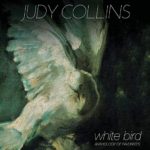
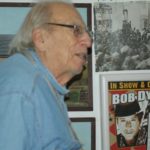
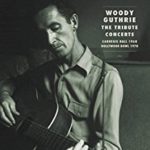
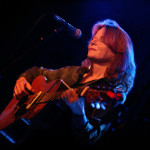

Be the first to comment!